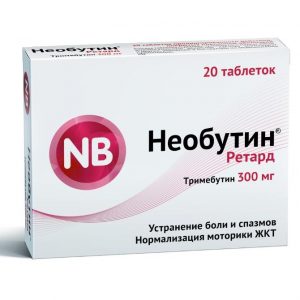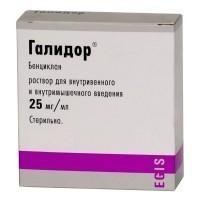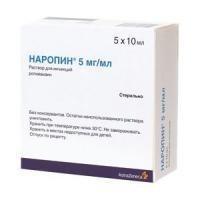Description
Latin name
Spasmalgon
Release form
Tablets.
Packing
10 pcs
Pharmacological action of
The composition of the drug includes: non-narcotic analgesic metamizole sodium, myotropic antispasmodic agent pitophenone and m-anticholinergic drug fenpiverinia bromide.
Metamizole sodium – is a derivative of pyrazolone. It has analgesic, antipyretic and anti-inflammatory effects.
Pitophenone – like papaverine, has a direct myotropic effect on the smooth muscles of internal organs and causes its relaxation.
Fenpiverinia bromide – due to m-anticholinergic action it has an additional relaxing effect on smooth muscles.
The combination of the three components of the drug leads to pain relief, relaxation of smooth muscles, and a decrease in elevated body temperature.
Indications
mild to moderate pain for spasms of smooth muscles of internal organs: renal colic, hepatic colic, spastic pain along the intestines, algodismenorea
can be used for short-term symptomatic treatment for: pain in the joints, neuralgia
myalgia as an adjuvant can be used to reduce pain after surgical and diagnostic interventions
if necessary, the drug can be used to reduce fever in colds and infectious and inflammatory diseases.
Contraindications
hypersensitivity to pyrazolone derivatives (butadione, tribuzon), other ingredients
expressed human liver or kidney
inhibition of bone marrow hematopoiesis
stable and unstable angina
chronic heart failure decompensation
tachyarrhythmia
zakratougolnaya form of glaucoma
prostatic hyperplasia
ileus and megacolon
granulocytopenia
deficiency of glucose-6-phosphate dehydrogenase
pregnancy and lactation
children under 6 years of age.
Precautions: mild to moderate hepatic or renal impairment, tendency to hypotension (systolic pressure below 100 mmHg ) tendency to bronchospasm increased individual sensitivity to non-steroidal anti-inflammatory drugs or non-narcotic analgesics.
Use during pregnancy and lactation
Contraindicated in pregnancy.
Breastfeeding should be discontinued during treatment.
Composition
1 tablet contains 500 mg metamizole sodium, pitophenone hydrochloride 5 mg and fenpiverinium bromide 0.1 mg
Dosage and administration
Inside, after meals, with water. Adults and children over 15 years old – 1-2 tablets. 2-3 times a day.
Daily dose – no more than 6 tablets.
Duration of admission is no more than 5 days. An increase in the daily dose or duration of treatment is possible only under the supervision of a doctor.
For children (only as prescribed by the doctor): 6-8 years – 1/2 tablet., 9-12 years – 3/4 tablet., 13-15 years – 1 tablet. 2-3 times a day.
Side effects
From the digestive system: burning sensation in the epigastric region, dry mouth.
From the nervous system: headache, dizziness, anticholinergic effects (decreased sweating, paresis of accommodation, difficulty urinating).
From the cardiovascular system: lowering blood pressure, tachycardia, cyanosis.
From the urinary system: impaired renal function, oliguria, anuria, proteinuria, interstitial nephritis, red staining of urine.
From the hemopoietic organs: with prolonged use – thrombocytopenia, leukopenia, agranulocytosis.
Allergic reactions: urticaria, bronchospastic syndrome, anaphylactic shock, Quincke’s edema, erythema multiforme exudative (including Stevens-Johnson syndrome), toxic epidermal necrolysis (Lyell’s syndrome).
Drug Interaction
Contraindicated use with X-ray contrast drugs, colloidal blood substitutes and penicillin.
With the simultaneous use of the drug with cyclosporine decreases the concentration of the latter in the blood.
With the simultaneous use of metamizole sodium, displacing oral hypoglycemic agents, indirect anticoagulants, ACS, and indomethacin from the protein association increases their activity.
When co-administered with phenylbutazone, barbiturates and other inducers of microsomal liver enzymes reduce the effectiveness of sodium metamizole.
When used with other non-narcotic analgesics, tricyclic antidepressants, oral hormonal contraceptives and allopurinol, toxicity may increase.
With the simultaneous use of sedatives and anxiolytics (tranquilizers) enhance the analgesic effect of Spasmalgon.
With the simultaneous use of thiamazole and cytostatics increase the risk of leukopenia.
When administered concurrently, the action of the drug is enhanced by codeine, histamine H2 receptor blockers, and propranolol (slowing inactivation).
When used concurrently, myelotoxic drugs increase the hematotoxic effect of Spasmalgon.
When used together with histamine H1 receptor blockers, butyrophenones, phenothiazines, tricyclic antidepressants, amantadine and quinidine may increase the m-cholinoblocking action.
Use with chlorpromazine or other phenothiazine derivatives may lead to marked hyperthermia.
Spazmalgon enhances the effects of ethanol when used simultaneously.
Pharmaceutical Interaction
Due to the high likelihood of developing pharmaceutical incompatibilities, it cannot be mixed with other drugs in a single syringe.
Overdose
Symptoms: vomiting, dry mouth, decreased sweating, poor accommodation, reduction of blood pressure, drowsiness, confusion, impaired liver and kidney function, convulsions.
Treatment: gastric lavage, administration of activated charcoal, symptomatic therapy.
Storage conditions
Store in a dry and dark place at a temperature not exceeding 25 ° C.
Keep out of the reach of children.
Expiration
3 years.
dosage form
dosage form
tablets
Zdrale HFZ AD, Serbia




